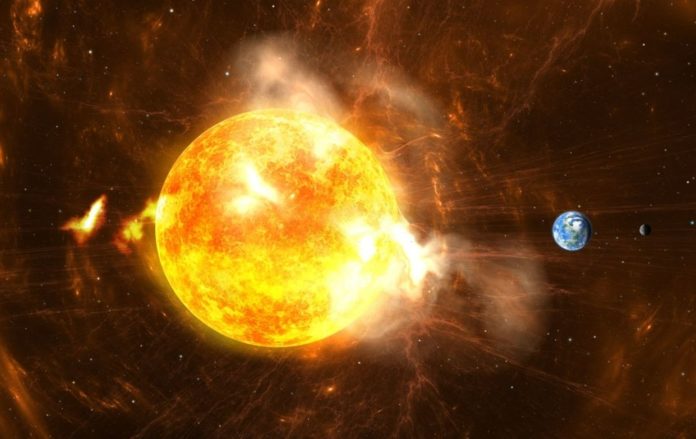A hole in the Sun’s southern hemisphere has developed, sending a flood of charged particles toward Earth. NASA’s Solar Dynamics Observatory (SDO) revealed a big “coronal hole” in the Sun’s outer atmosphere, known as the corona.
Between Saturday and Sunday, the stream of “gaseous material” escaping this hole is expected to impact the planet.
According to the website SpaceWeather.com, this could cause mild geomagnetic disturbances in the planet’s magnetosphere, which is the region of space where Earth’s magnetic field is strongest.
Solar winds are a continuous stream of plasma that flows outward from the Sun’s corona.
Free-flowing electrons and protons make up the majority of the plasma.
The streams escape the corona, the Sun’s outermost layer, which may reach temperatures of 1.1 million degrees Celsius.
Coronal holes are thought to be the source of most solar wind emissions.
In the polar regions, the stream moving towards Earth is predicted to produce some stunning aurora phenomena.
The good news is that the prognosis does not expect any technological or communication-related consequences.
Solar storms have been known to knock out satellites or cause power outages, depending on their severity.
SpaceWeather.com’s astronomers wrote: “Earth is exiting one solar wind stream. Another is on the way.
“Flowing from a southern hole in the sun’s atmosphere, the gaseous material is due to arrive on November 21 to 22.
“NOAA forecasters say that a corotating interaction region (CIR) travelling just ahead of the stream could spark geomagnetic activity and Arctic auroras on November 20.”
A compression region that arises ahead of a coronal hole stream is referred to as a corotating interaction region, or CIR.
They form when the slower solar winds collide with the faster-moving stream.
They usually develop ahead of “more persistent coronal holes,” according to the American Meteorological Society.
When they reach Earth, the strength of the interplanetary magnetic field increases, which can cause geomagnetic storms (solar storms).
Solar storms are classified as “G1 Minor” to “G5 Extreme” on a scale of one to five.
Minor storms, according to the US Space Weather Prediction Center (SWPC), can generate modest power grid oscillations and disrupt satellite operations at the lower end of the spectrum.
Weak storms in the polar areas can also cause auroras by causing atoms and molecules of gas to reach new energy levels.
Extreme storms, on the other hand, have the potential to cause widespread blackouts and communications failures.
They may even produce auroras as far south as Florida or Texas, according to historical records.
The approaching solar winds are not likely to have any discernible impact on the planet, according to the latest SWPC forecast.
Instead, the three-day forecast predicts “unsettled to active levels” of geomagnetic activity “due to coronal hole high-speed stream (CH HSS) effects”.
Similarly, no radio blackouts are expected over the weekend, according to the SWPC.
Image Credit: iStock
You were reading: Scientists warn of new solar storms – will hit Earth over the weekend
